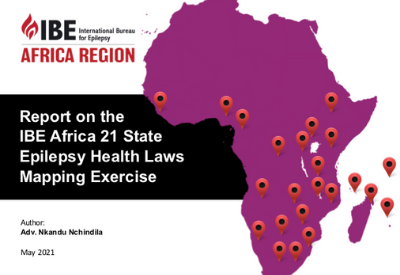
WHA Resolutions 68.20 and 73.10 implore all UN Member States to address epilepsy as a public health imperative by developing and implementing global and national action plans on epilepsy. Further, UN Member States are encouraged to reinforce human rights based policies and laws for people with epilepsy at national and international levels through novel strategies. However, on the African continent, very little progress has been made in this regard. In fact, despite several African States committing to international treaties concerning the universal right to health and the protection of the rights of persons with specific health needs, there is still a dearth of unambiguous national policies and laws as well as accompanying monitoring and enforcement mechanisms.
This report reflects on how health laws may be used to strengthen the prioritisation of epilepsy in resource-restricted settings, specifically, in the African context. Health laws are defined by WHO as the area of law concerned with the health of individuals and populations, the provision of healthcare and the operation of the healthcare system. Through a health laws mapping exercise, the state of advancement and implementation of resolutions concerning epilepsy can be monitored. Doing so will add value to anticipated evaluation mechanisms stemming from WHA Resolution 73.10 which calls for a Global Action Plan on Epilepsy (and other Neurological Disorders). This will further provide evidence-based research for epilepsy advocacy strategies on matters concerning health legislation and national policies.
By and large, the existing data on health laws in Africa is not easily accessible, nor regularly updated on public platforms and is not comparable between States. In the context of making epilepsy a priority in Africa, the status quo reduces the capacity of key interlocutors to develop national policies, plans and evidence-based responses on epilepsy. This further hinders efforts to monitor and report on progress made towards implementing WHA Resolutions 68.20 and 73.10.
Twenty-one African States are analysed in this report through their international commitments and the hierarchy of their national laws as they relate to epilepsy. These are: Angola, Botswana, Cameroon, Comoros, the DRC, Eswatini, Kenya, Lesotho, Madagascar, Malawi, Mauritius, Mozambique, Namibia, Nigeria, Rwanda, Seychelles, Sierra Leone, South Africa, Tanzania, Zambia and Zimbabwe.
The international and regional treaties of particular relevance to this study are: the ICCPR, ICESCR, CEDAW, CRC, CRPD, ACHPR, the AU Disability Protocol (not yet in force), the Maputo Protocol, the African Children’s Charter and the African Youth Charter. None of the twenty-one States studied in this report have ratified all ten instruments however, Angola, Rwanda and South Africa have ratified nine of the ten instruments and have, at least, signed the outstanding one – thereby indicating intention to ratify the instrument at a later stage. The concepts of signing and ratifying an international treaty are discussed in Section B of this report. Nonetheless, domestic implementation of international treaties remains a critical challenge in the States studied.



